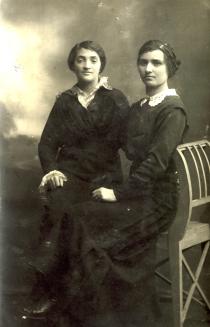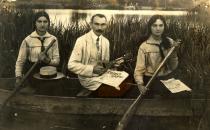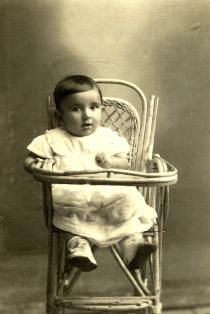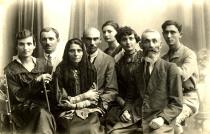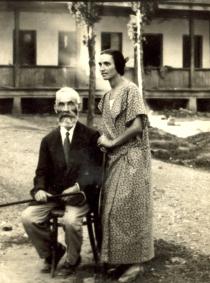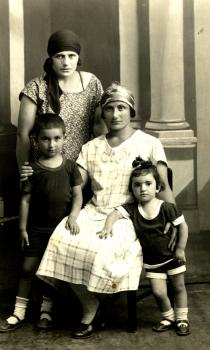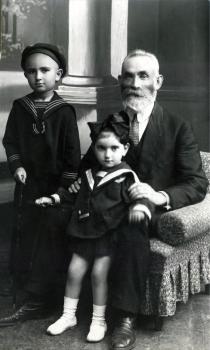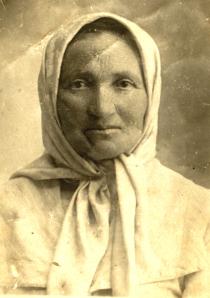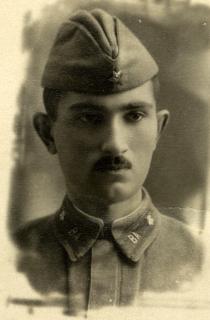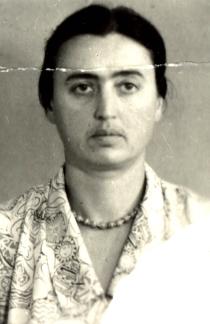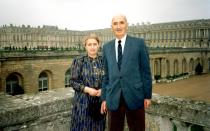
Lev Yagupolskiy
Kiev, Ukraine, 2002
I was born on 6 February 1922 in Uman Cherkassy region. Uman is one of the most picturesque towns in Ukraine. It is located halfway between Odessa and Kiev. It is famous for the Sofievka park. This is perhaps the most beautiful park in Eastern Europe. Hasid tzaddiks (holy men) had been buried in Uman and it became a place of pilgrimage for Jews from all over the world. A rather big Jewish community has always lived in Uman. Uman belonged to those areas in the Russian Empire where Jewish people were allowed to settle down.
My father Moisey Lvovich Yagupolskiy was born in 1887 in Uman. He finished a Jewish trade school (3 years) and worked as a specialist of firebricks. These bricks were used in the construction of fireboxes in locomotives. There were deposits of fire clay in Ukraine to manufacture firebricks. My father was a very good specialist of the manufacture of firebricks. In the 1930s he was deputy director of a brick factory in Kiev and during the war he helped to organize the production of firebricks in Orsk, Chkalov region in the East. After the war he returned to Kiev and kept working at the brick factory. My father died in 1964 when he was 77.
I know that my father comes from a family of millers from Balabanovka village in the vicinity of Uman. Recently I met a man that knew my father and he told me that my father had been a well-respected man. [He was a miller at first]. He always helped people and if they didn’t have money to pay him immediately, my father ground flour at no cost to the people. I was curious about the origin of our family name and once I found the word “Yagu” in a book. It turned out this name derived from the word “yagve” meaning “god” in Polish. We might have had some roots in Poland, and that was where the “polskiy” came from. My grandfather’s name was Leib (Lev). He was a miller. He was born in a Jewish family in Balabanovka village in the 1860s. He was religious: he went to the synagogue, observed traditions and holidays, honored Shabbath and followed kashrut. He died in Uman in 1920 from some disease. My grandmother (my father’s mother) Hanna Yagupolskaya was also born in Balabanovka village in the 1870s. She was a housewife and she was religious. She went to the synagogue, observed traditions and holidays, honored Shabbath and followed kashrut. She was very nice and kind. I remember how she prepared meals for me: she made flat shortcakes and spread some ground poppy seeds on top.
See, I am 80 years old but I still remember my grandmother’s shortcakes. She was laconic, she was very reserved and she worked a lot. She was always conservatively dressed in a long black gown and with a kerchief on her head. Grandmother did all the work in the house, there were no servants, she did not trust anybody, she did all by herself. She got up at five in the morning and worked until nightfall. Later the children helped her. She was exterminated in Uman in 1941. The Germans killed her. My father failed to get her out of Uman.
My grandfather and grandmother had 12 children. I have no information about them. I only remember some of their names: Shlyoma, Ilia, Fania. Grisha moved to Palestine when he was young. When my wife and I were in Israel we tried to find the children of my father’s brother. They changed their last name to Yagor, but we failed to find out anything about them. Isaak, one of my father’s brothers moved to America in the 1920s. I only know that he lived in Mexico for some time. I have more information about my father’s two sisters. They are Vera, born in 1904 and Betia born in 1906. They didn’t have any education and they were housewives. When I was small they were living in our house and helped my mother about the house. There was no place in the house of the grandparents and they lived with us. They did not marry and had no children. They perished along with my grandmother in Uman in 1941.
My grandfather (my mother’s father) Shmul (Samuel) Fabricant was born in Balabanovka village in 1855. He was a senior man at the Jewish community in Balabanovka village, but he lived in Uman mainly. There were many Jews in Balabanovka, and my grandfather was responsible for the official issuance of documents to recruitment to the tsarist army. He knew all traditions, laws and was a very intelligent and educated man. He was very fair and people always came to ask his advice. He was dressed like everybody else around. He was wearing a long beard and a hat, though. My grandfather had an apartment somewhere, but I don’t remember it. The family celebrated holidays according to the Jewish traditions and rituals. I remember my grandfather teaching me to say my prayer at Pesach, and I pronounced it quite clearly and everything was according to the rules. I remember general talks with my grandfather. He spoke Russian to me because I didn’t know any Yiddish, only a few words. I studied Russian at school.
I always had to learn a few words in Hebrew before the holidays. The rules required having a drink at Pesach. I remember small silver wineglasses with wine. My grandfather’s daughters, my mother and her sister Eva were responsible for laying the table on holidays. There was only kosher food on the table. The food was very delicious: stuffed fish, very special meat with prunes, deserts: strudel with jam, apples and nuts. They spoke Yiddish in my grandfather’s family, their correspondence was in Yiddish and the pictures were signed in Yiddish.
My grandmother Hanna Fabricant (my mother’s mother) was born in Balabanovka village. I know very little about her, they didn’t talk much about her in the family. She died in Uman in 1923.
My mother had two brothers and two sisters: Abram was born in 1885. He was a pharmacist. He lived in Uman and then he moved to Kiev. He was the guardian of Jewish traditions in the family. He established the rules to be followed. He always went to the synagogue, observed Shabbath and other holidays, followed the kashrut rules even when it was almost impossible. They talked Yiddish in his family, although his children went to Russian schools. During the war he evacuated to Kokand in Uzbekistan and stayed there. He was the director of a pharmacy. He observed all Jewish traditions in Uzbekistan, too, although there was no synagogue there. He had 3 children. One of them lives and works in Kiev, and two others live in Israel. He died in Kiev in 1995. Isaak, my mother’s 2nd brother, was born in 1897. He worked as an economist in Uman and died there in 1985. He didn’t have a family of his own. Eva, my mother’s sister, was born in 1900. She lived in Moscow and was a housewife. She died in 1983. Her children and grandchildren live in Moscow. Lisa, my mother’s younger sister, born in 1920, lived in Uman. During the war she was in the evacuation. She died in Uman in 1996. She had no family of her own.
My mother Rachil Shmulevna Yagupolskaya (nee Fabricant) was born in a very respected Jewish family in Uman in 1895. She studied at school for 7 years. It was a Jewish school for children from well-to-do families. My mother was a very educated woman. She could write in Russian and Yiddish and she read a lot. For its time it was a very good education for a girl. Their family was religious and my mother observed traditions and holidays, honored the Shabbath and followed the kashrut. She was a housewife spending her whole life raising her children. She dedicated herself to her family. She was convinced that a woman was bound to take good care of her home and children. That’s why she didn’t work. She shared my father’s joys and sorrows and supported him in the evacuation in Orsk. She returned to Kiev in 1946 and lived with my sister’s family for the rest of her life. She died in Kiev in 1991 when she was 96 years old.
My mother’s family was different from my father’s family. My mother’s family was more educated. And my father’s family was a modest family of workers. His sisters were often helping my mother about the house working as housemaids. They knew one another since they were children, but they only got married in 1920. I don’t think my mother’s parents gave their consent to my parents’ marriage. My father came from a lower level family, and it wasn’t easy for him to get education. My father courted my mother for 8 years. My mother listened to her parents’ advice – it was important for her. However, my father was insistent and he got what he wanted. They were very much in love with each other and didn’t want to listen to what their parents were telling them. They waited and believed that the time would come when all people would live happily. If it hadn’t been for the revolution their marriage would not have been possible. Before the revolution marriages between people from different social classes were not allowed. But in the 1920s such marriages were even fashionable. They had a Jewish wedding: with huppah, Jewish songs and dances and traditional Jewish dishes.
My mother told that once she rescued my father’s life during the pogroms. She was a very beautiful woman and when the bandits broke into the house she came ahead of my father and told them to kill her first before they wanted to kill my father. And they didn’t touch my father. My parents always talked in Yiddish, and my sister and I spoke Russian. My sister and I also understood little Yiddish. We observed all holidays and traditions until we moved to Kiev in 1936. It wasn’t safe to follow any religious tradition in Kiev, it was unpopular and any religious expression was persecuted by the authorities. Our parents went to the synagogue in Uman and later when they were living in Kiev. They were moderately religious and celebrated all holidays. I can hardly remember the celebrations. I was probably not very interested in the details. I can only remember that there was a lot of delicious food on the table. This was different from everyday life.
We lived in a nice house in Uman. It was a brick house consisting of 6 or 7 rooms. My parents were well-to-do people and could afford such a house. They had no housemaids. My mother did all the housekeeping by herself. She had a lot of work to do: bring water from the well, start a fire in the stove and cook for the whole family, etc. There were 4 of us: my father, my mother, my younger sister and I. My sister was born in 1926 (she was 4 years younger than I was). Her name was Ania. We were not very close. We were very different. It happened so that I’ve achieved much in life, and my sister didn’t reach any successes in her studies. She was a very weak girl. Perhaps, it was because of the concussion that she had had when she was a child due to an accident: she got run over by a horse.
When I was under 5 years of age a German woman came into our house and said that she would live in the spare room that we had and teach me German. She was a very good teacher and I spoke fluent German when I was 5 or 6 years old. She seemed an old woman to me, although she could not have been more than 50 years old. She was short and nice and she used to tell me fairytales. My knowledge of German was very helpful. I read lectures at German Universities and completed some tasks during the war.
I had a governess before I went to school. She was Jewish. A governess was someone that had 5-6 children to teach and prepare for school. Our governess was about 30 years old. Parents took their children to her place and she gave us classes in Russian. Our governess was an exceptional teacher and she gave us very good knowledge. I went to school when I was 6 years old, but when I was to go to the 2nd form they told me that I with my knowledge I had to go to the 3rd form. Quite a few children that were pupils of this governess were my friends. And I know that they grew into very important people. One of them studied Arabic and another one was a scientist.
There were Jewish schools in Uman, but I finished a Russian school. It was thought that Russian schools were more progressive and gave a better education. Russian, Ukrainian and Jewish children studied in this school. We got along very well. I didn’t know any differences at that time. People were either good or bad. There was no discrimination by nationality. My father and mother spoke Yiddish, and my sister and I spoke Russian. Our parents spoke Russian to us.
We had beautiful ancient Russian books at home. My mother got them from her father. They were Russian and world classical literature publications, children’s books and fairy tales. My parents used to read a lot and had lots of interests. They ingrained this in me and my sister. My father had a book of prayers and a Torah. I’ve never read the Torah, somehow I’ve never got to it.
I remember well the famine of 1933. The way they put it sounds that Ukrainians went through this famine. But it was about all people living in Ukraine. What saved us were 3 sacks of carrots that my father got somewhere. My mother gave us 1 or 2 carrots per day and it was a sufficient support for us or otherwise things would have turned much worse. It was a common calamity for everybody and everybody was trying to survive.
In 1936 my father moved to Kiev. He got a job assignment at the Kiev brick factory. He constructed a house in Kiev and then moved his family there. This house is still there in Franko Street in the center of Kiev. It’s a one-storied house. Our family had two rooms, and there was a tiled fireplace in the house. There were all comforts in the house: a toilet and a kitchen. My mother lived in this house until the last day of her life. The authorities wanted her to move out, but I helped her to stay in the house.
I finished 8 years of school in Uman and studied in Kiev in the 9th and 10th forms. There were many Jewish children at school, both in Uman and in Kiev. I had a friend Yura Kaganovich –he was Lazar Moiseyevich Kaganovich’s nephew. Yura’s father was Director of the Central Grocery store in the center of Kiev. Once I heard an interesting discussion when somebody from the Municipal Council visited him and offered him to become Chairman of the Kiev Municipal Council. His answer was “Lazar- has a big head and I have a small one. I am director of the grocery store and that’s where I belong”. Yura and I were fond of Chemistry and we entered the Chemistry Department at Kiev University. I had a laboratory in the kitchen at home and I often experimented there until 2-3 o’clock in the morning. I entered the Chemistry Department in 1938 easily. I had excellent grades at school and so I didn’t have to take any exams.
Yura was my very good friend. We went to the cinema and theater and played volley-ball together. I named my son after him. He perished during the war in Moldavia in 1943. He was a very gifted man, he learned to play some musical instruments in 3-4 months. Yura was courting Oksana Meyerkovskaya, a Ukrainian girl. I remember how Yura walked on the arch of the Paton bridge (a 30 meter high bridge in the park area in the center of Kiev) to demonstrate his love to this girl. He had a fracture in his arm and the consequences would have been terrible if he had fallen. Oksana lives in America now, her father was President of the Ukrainian Academy in New York. She stayed in Kiev after the Germans entered it and got married. When the Germans were retreating she left with her husband. Yura was very upset when he found out that she had left. He was an interpreter on the front, but after he heard about what happened he became an intelligence officer. He was probably looking for death. He loved Oksana dearly.
In the late 1930s Isaak and Abram, my father’s brothers, and Eva, my mother’s sister also moved to Kiev. Our relatives used to get together. I cannot say it happened often, but it was every now and them that we met them. My mother helped them, she managed to save some money and help the family. Their children always came to my mother with their problems. We celebrated holidays and birthdays together. My mother cooked many very delicious Jewish dishes. Her stuffed fish was very special, she was the only one that could make it this way. She could spend a whole night cooking it – it was like a piece of art. She stuffed chicken neck, made liver paste and very delicious jam. We didn’t eat pork in our family. We were poor. My father’s salary was rather modest, and he was the only breadwinner in our family. He lost his business. All private businesses were persecuted by the authorities. During the Soviet rule families didn’t own or live in big houses. People were deprived of everything they had had before the revolution: business, house, social position, just everything. After the civil war was over thousands of people had no food for the day or a place to live. Ten or more people had to share one room, etc. Brick factories belonged to the Ministry of Railroads. Their employees were wearing a dark blue uniform. My father received a piece of dark blue fabric to make a uniform, and my parents gave it to me to make my first suit when I was a student.
My father was working very hard at the brick factory. He often went on business trips to other factories. The factory that my father worked at was in Korchevatoye (in the vicinity of Kiev). I was there once and saw how bricks were manufactured. He wasn’t a member of the Communist Party. He was a taciturn man. He took no interest in politics and my mother didn’t either. My mother’s only interest was to give education to her children. One can understand this. Our parents didn’t have an opportunity to study. The Soviet power gave their children a chance to get education. I was doing well in physics, chemistry and mathematics. But when it came to the history of the Party or socialist economy I wasn’t doing so well. My mother was convincing me to learn them, too. It was thanks to my mother’s influence that I had all excellent grades and finished my studies at the university successfully.
There was no anti-Semitism before the war. We got along well with all people. At the university we helped all other students that were having problems with their studies. Many students came from villages and their education wasn’t so strong as ours. I had Russian and Ukrainian friends and we were living as one family. I can’t remember any maltreatment at school or at the university. I was a leading student at the university. I was Chairman of the Scientific Group at the university and a Komsomol activist and I believed in all Communist ideas. All people did. This was the way we were brought up. We had no idea about the arrests, repression or prison camps. Ours was a common family far from any politics. We were devoted pioneers and Komsomol members. We believed that everything in our country was right.
I was very fond of sports at the university and I went in for sports for the rest of my life. My favorite sport was volleyball. I liked to study. Our lecturers were outstanding chemists and great scientists. I took to science during my first year at the university. I liked it a lot and I arranged a small laboratory at home. My mother was very patient with me. She felt that it was all interesting for me, although sometimes it led to incidents like minor explosions or fires –I even burnt my mother’s gown once.
Students at that time were reading a lot. We loved Mayakovskiy (one of the greatest Soviet poets), we attended performances of the MHAT Theater (Moscow Art Academic Theater). We didn’t have money to buy a ticket. I had a friend – Valentin Seliber. He did the following – if after the first act one goes outside for a smoke one gets a free pass to come back. He received 30 of such passes. We always entered the theater after the first act of a play and saw all MHAT performances.
Kiev theaters are beautiful. The Kiev Theater of Russian Drama was very good. The actors were wonderful and they acted in beautiful plays.
There was a Jewish theater in Kiev at that time. These were plays of Jewish writers, staged in the Russian translation. We often went there: Ukrainian, Russian and Jewish boys and girls. We enjoyed going there. I read all works of Sholem Alechem., in Russian translation. I had books by other Jewish writers, by Ehrenburg, Babel, etc. They influenced my cultural background very much. Jewish poets were often published then. We knew nothing about what happened to the majority of Jewish writers and poets. Many of them were liquidated by the Stalin’s regime or died in camps and prisons. But we only heard about it in the 1980s.
I remember well the day of 22 June 1941. I was standing in the yard in Franko street and saw the aircraft flying and bombing. I saw one plane brought down, but I didn’t realize how serious it all was. Later we, students, were sent to excavate trenches. We were excavating them in Vassilkov near Kiev. My father had to work on an important mission – fix firebrick manufacture process in the rear. He said to the Komsomol authorities that he was going on an important mission and he couldn’t go without his son. He realized that there had to be special methods of convincing me, because I was a Komsomol member and wouldn’t go if my father had come for me by himself. I was summoned to go to Kiev from Vassilkov. My father saved my life. All university students perished there.
Before the beginning of the war I finished 3 years at the university. My father was evacuated to Tambov. The nearest university was in Saratov 500 kms from there. I submitted my documents for transition and studied about a month there. We, students, all wanted to go to the front. Each time we went to the military recruitment office and wrote applications that we were volunteers to the front. We were 4th year students. And by that time a decree had been issued with the directions to recruit no 4th year students to the army. There was only one year left and we had to finish our course at the university. It was surprising to me: in the middle of this war what difference did it make whether I finished the university or not? There were seven of us, guys, we were young and stupid. But we were patriots. And we wrote a letter addressing it to Stalin. We were all Jewish boys. We wrote to him that they were not taking us to the army. Of course, that letter never reached Stalin, but in a week's time we were summoned to the military recruitment office and they sent us to the Military Academy in Moscow. On 16 November (the most dangerous day for Moscow: Hitler occupied the nearest access to Moscow and panic broke out in the town) they woke us up in the middle of the night and I thought we were to be sent to the Moscow defense line. All military academies were moved to Middle Asia from Moscow in one night. There were 140 of us in one carriage, 8 on each berth. We were turning all together on it after we received an order. We studied in Samarkand until 1942. We studied from morning till night until we became real officers. There were 3000 of us.
We were needed there, because when I was at the front I found out that intelligence officers had found some shells with chemical substances near Smolensk. The commandment and soldiers didn’t take the dangers of chemical hazards seriously. Soldiers had enough difficulties besides carrying the extra weight of gas masks, they thought. I was in a rifle regiment on the very front line. In my regiment everybody had gas masks, it was a strict requirement. We arranged smoke screens against tanks, we had to complete very serious tasks. Once my knowledge of German almost killed me. This happened at the Kalinin front. On 25 December 1942 there was shooting – they were shooting, we were shooting. Then all of a sudden it became very quiet. Our commissar called me, gave me a megaphone and told me to go to the 1st trench (about 100 meters from Germans) and say whatever occurred to me. He said the Germans were preparing a break throughsomewhere and the only way to identify the location was to force them start shooting. I started talking against Hitler – no response. Then I said that they came to our land and they would be defeated like they were near Stalingrad. There was no reaction from them to whatever I was saying. I thought I was going to fail to complete the order. But then I recalled that our newspapers wrote about a train of French and Italians arriving in Germany. And I said “You are sitting here in the country that is not yours, and your wives are at home with the French and Italians, great masters of love making…” And they started shooting on one end, and then on another end.
Our side responded. There was so much shooting that I was under a layer of soil. Later they pulled me out of there. It turned out it was their Catholic Christmas and they weren’t preparing any action against us, they were just drinking their schnapps. They say Jewish people did not fight. I remember Bogomolniy, a battalion commander, a Jew. His soldiers carried him out of the battlefield with a wound in the stomach. There was no anti-Semitism on the front. My orderly was Onischenko, a Ukrainian. He was a senior sergeant. We got along very well. We were one big family. It couldn’t have been otherwise. We only distinguished between a good man and a bad man. I was 19 years old, and many soldiers were older than me. The war was a little bit like a game for me. Different things happened in the war. In 1942 Stalin issued an order “Not one single step backwards!” and anybody suspected of being a coward was to be shot with no delay. One man there stretched his hand and the German bullet targeted it, and he was shot as a suspect for trying to find an easier way to leave the front. I learned important lessons in the army. There was much concern at the Kalinin front with regards to a chemical attack.
A general arrived to check the readiness of military units to a chemical attack. In the morning the Germans began shooting with smoke shells producing a crimson smoke screen moving in our direction. The general gave a command “Gases!” Everybody put on their masks in my regiment. The general finished his inspection and left. In 3 days time there was an order issued at the Kalinin front to promote the Head of Chemical Department Yagupolskiy to the rank of senior lieutenant and position of Chief of Chemical Department of the Division. Very soon I was sent to Moscow – mine was a very high position. I arrived in Moscow but my division had already left for the front. I kept submitting my requests to be sent to the front but I was refused. I was sent to Novosibirsk and then to Omsk to lecture at the Officers’ College. I was teaching tactics and Chemistry. In 1943 I visited my parents in Orsk on my leave. My father worked at the brick factory. They lived like any other family in the evacuation. My sister lived with them, studying at school.
I served in the army until 1945. When the war was over on 9 May 1945 I wanted to demobilize, but they were convincing me to finish the last year at the military academy. However, I kept submitting my requests until I demobilized and returned to Kiev in September 1945.
Kiev was completely destroyed. Other people were living in our apartment. Our military unit was located in Nezhyn after the war. And when commander of the regiment found out that the man living in our apartment had supported the Germans during the war he said “I will give you a platoon of machine gunners and we shall throw him out of there”. But it didn’t come to this measure. I just showed my documents and he moved out in a week. My father and mother were staying in Orsk because of my father’s work. My sister Ania arrived and my sister and I were living in our house. There was a wardrobe that my father bought in 1915 in Warsaw. We made a small stove with a stack out of the window that filled the room with a lot of smoke. Life was very hard. My father worked at the brick factory and my mother stayed at home. She always tried to make our home warm and cozy. She could make a dinner from the least that we had and have sufficient food for everybody. I understand now that she may not have had enough food herself. My father’s salary was hardly enough to provide some food for the family. We didn’t have clothes or shoes, but everybody had a similar life and nobody went deep into his problems. Everybody understood that the terrible war was over and that the main thing was that we were alive and we won. And that people would overcome difficulties in due time. I continued my studies at the university. In early 1946 my parents came and we all lived in the small room as the stove heated it.
I missed four years of studies when I was in the army. But I felt such an urge to study. I made notes of Palladin’s biochemistry from the 1st to the last page on some newspapers and in fine handwriting. We were fanatic students. We committed ourselves to studying. I was involved in scientific work. I was dreaming of making discoveries in organic chemistry. Then upon graduation from university I received the job of deputy editor at the regional newspaper related to my Communist Party activities. I became a member of the Communist Party in 1943 at the front. We were following the call “Communists – go ahead!” I was a patriot. I had no doubts about things. So, I thought I had no right to refuse this job. They told me: “Kharkov is the town of students, an industrial town, and they need somebody good at all these scientific issues”. I was trying to explain to them that I wanted to do what I was most interested in – my scientific work. But this assignment was not subject to any negotiations – they told me that I would be expelled from the Party if I refused to follow their instructions. What it meant at that time was that if this were to happen I wouldn’t have been able to find a job or would have had all kinds of problems in life.
Academician Kupriyanov, my tutor, saved me then. He had a lot of influence in the Academy of Sciences. He sent a letter to the Party authorities and they dismissed me sending to the postgraduate university course.
I went through the period of struggle against Cosmopolitism in 1950s. I lived through this period relatively all right. I am afraid I didn’t quite understand what was going on in the country. I was busy working from morning till night. I had a small boy and didn’t listen to what was said in the radio broadcast or written in the mass media. Besides, all people ultimately believed in what was written in the newspapers and they believed that it was right. This process didn’t touch our family directly and I wasn’t quite interested in the essence of it. I was too busy at work. We heard that so many innocent people suffered much later, in the 1980s. Here is my story. I was a member of the Communist Party and a fighter for justice. At that time the authorities were trying to get rid of the Jews for any reasons possible. My colleague read to me an article about Cosmopolitism by Dmiterko (a Ukrainian poet and political activist, quite forgotten nowadays).
Dmiterko wrote that “Der Shtern”, a Jewish magazine, was published in Ukraine. I had never seen it, I didn’t know Yiddish, my parents only spoke Yiddish with each other. They always spoke Russian to us. I didn’t even know the alphabet. He wrote in this article that the magazine had to be closed, because it was published by the bourgeois nationalists. I said “why close this magazine, not all Jewish people are nationalists”. This man (I knew him well) went and reported on me immediately. There was a party meeting to discuss the issue of expelling me from the Party which meant that I was to leave the university. But my students and colleagues stood for me although it was dangerous for them. I was reprimanded for “promoting the elements of Jewish bourgeois nationalism”. This was a lucky ending for me. I might have ended in Siberia, if things turned out in a different way. The situation with anti-Semitism eased a little after Stalin’s death. The dictatorship was reduced, and a new period of the development started in the Soviet Union. But still, unofficially, the Jews were not quite favored in the official institutions of various levels.
I met my future life Lidia Naumovna Kuritskaya at the university. She was born in a very intelligent family in Kiev in 1925. My wife is half-Polish. Maria Klementievna Yatsemirskaya, the sister of my mother-in-law, was Catholic, and Elena Klementievna, my mother-in-law, was (Greek) Orthodox. My mother-in-law registered her nationality as Russian, and her sister – as Polish. They were 3 brothers and 2 sisters in the family. They all had Jewish spouses. Elena Yatsemirskaya, my wife’s mother, was a surgeon. During the war she was on the First Ukrainian front and after the war she worked at the Children’s Hospital in Kiev. Naum Kuritskiy, my wife’s father, was an engineer, a bridge designer. He was involved in the construction of a bridge across the Oder (in Germany) when our army was advancing toward Berlin.
Lidia was one year younger than I. She also studied at the Department of Chemistry. She returned from the evacuation and continued her studies. She noticed my picture on the Board of Honor (pictures of the best students were displayed there). She approached me and said that she wanted to meet the best student of the university. That was how we met. She studied physical chemistry and I studied organic chemistry. We got married in 1948. There was no wedding party, only a civil ceremony. We just got together with our friends in the hostel. Everybody brought whatever they had, we ate and drank and that was it. We lived at my parents’ place in Franko street.
We remember Stalin’s death well. My wife was on a business trip in Moscow and she was almost killed by the crowds. The death of the leader was a tragedy for us and we couldn’t imagine what was going to happen to the Soviet Union. I remember well the “doctors’ case”. It was a troublesome time. People didn’t want to visit Jewish doctors. They believed in what the mass media wrote. They believed that Jewish doctors were murdering and poisoning their patients. Such was our upbringing that we believed the communist newspapers and propaganda. My specialty was pharmacology and at first people didn’t want to hire me. As soon as they closed the “doctors’ case” I was offered a job. We didn’t understand much, we didn’t even have radios and we were not allowed to listen to foreign stations. We knew nothing. Only later did we get some information. Later I got a job at the Academy of Sciences. I had an employment agreement with a pharmaceutics factory.
I developed the Levomycetin (antibiotic) technology and the technology of Rontgen contrasting agents for the diagnostics of liver and brain diseases. I manufactured the substances that were injected into the carotid artery to identify brain tumors. These were my first steps in the direction of neurosurgery. I even have kept the first brain photographs. We were doing this when the world didn’t know anything about it. The first surgeries of this kind were performed in America 5 years’ after we did it. Based on this and other work I became candidate and then Doctor of Chemical Sciences. My works – books and articles were known in other countries.
Lidia Naumovna, my wife, finished the post-graduate course and became candidate of science. She worked at the Paton Institute (Kiev Institute of Electric Welding named after Academician Paton). Later she worked at the Institute of Materials. She defended her thesis in Moscow.
My son Yura was born in 1949. When Yura was born, my wife’s father said he wanted to retire to raise his grandson. He had strict rules. Yura’s day was planned to details. As far as I can remember he was always teaching Yura. Our son is a chemist, he studied at the Chemistry Department. He returned to the university as a professor. Now he is the chief of the laboratory that I founded. He identifies himself as a Jew and he understood that he was born in a Jewish family.He remembers my parents well. They were raising him, too, and must have told him about their Jewish roots. However, we haven’t discussed our Jewish origin in the family. Yura grew up in the international family and has never faced any anti-Semitism. At the time when he was entering university the official anti-Semitism was a thing of the past. People knew me at the university and wouldn’t have dared to plot against the professor’s son. Our family has never been religious. We didn’t go to synagogue or observe any traditions. It happened so that we are all internationalists and develop our relations on the basis of kindness, decency and love to each other and to the people around, regardless of their belief. Of course, Yura doesn’t know anything about Jewish history and traditions; he doesn’t go to synagogue or celebrates Jewish holidays. I don’t think he has time or energy for this. He has worked a lot. He works at the computer and he knows English well. His English is fluent, and my German is fluent. We can communicate with the whole world. We make a good team. Yura married a lovely Russian girl Tania. She graduated from the same university and she is a chemist. They fell in love and got married. We didn’t mind. We like Tania, she’s made a wonderful wife and a beautiful mother for my granddaughter. We get along very well with her. Nationality is of no importance to her. They often visit us on our birthdays or come by for a cup of tea in the evening. We enjoy each other’s company.
My son’s wife worked as a teacher, and now she’s retired. My granddaughter Maria, born in 1973, studied at the Philology Department at the university. She is an editor at a trade company. She earns good money. I think she earns more than my son. Although my son is professor, she works at a company and she earns well. She knows about her Jewish origin and she has never concealed it. But she is an internationalist and I don’t think she takes any interest in the issues of nationality.
My sister’s fate was tragic. She was a sickly woman. She worked as an accountant, but she didn’t have a higher education. She always identified herself as a Jew, but like me she didn’t keep any Jewish traditions. In 1991 Ania poisoned herself with gas in her kitchen. Her husband, Jew, Boris Isaakovich Reznikov was an engineer. He worked at the vegetable storage facility. He died soon, too. He had asthma and heart problems. Their son Lyonia is a very sickly person. He is alone. He works in a library now.
I have always been interested in the Jewish way of life. My wife and I have subscribed to the “Jewish News” newspaper. I have lots of books about the Jewish history and the Jews in Ukraine. I hardly remember any Yiddish. Regretfully, we’ve forgotten all Jewish traditions and holidays and we do not observe them. We were atheists in the past. It is good that there are synagogues and Jewish communities in Kiev. [But] we do not go there. We have no time and we feel uncomfortable after so many years away from the Jewish way of life. My wife and I got to the Babiy Yar at the anniversary of this tragedy. I have never forgotten my Jewish identity. If I were not a Jew I would have become an Academician. The Central Committee of the Communist Party issued an order to promote the national (Ukrainian and Russian) employees. But I wouldn’t say that it had a severe impact on me. I am glad that I had an opportunity to work. I am called an outstanding personality and one of the greatest scientists in the world. This acknowledgement is very important for me.
The situation has changed radically in our country lately. There is freedon of freedom of speech and freedom of press. We couldn’t even dream about going abroad and meeting with our friends before. They were always called traitors and it was not allowed even to correspond with them. We’ve got the opportunity to think and sday what we think. We’ve stopped suspecting each other in spying and reporting. Our children are different from us – they are free and uninhibited. They don’t have fear of the existing regime, the fear that has been with us our whole life. And this is beatiful.
I am 80 years old. I work from 10am till 7pm. My wife is a pensioner and she is not very happy about me working. I have students, I work in a scientific school of chemistry. I was an Honored Worker of Science and was awarded the State Prize of Ukraine. I have been in many countries in the recent years. I lectured in Germany, Czeck Republic, Poland, and France. I’ve also lectured at the Jerusalem University. I liked it there, but I am not young any more and I don’t want to change my country of living.
I can call myself a happy person. I have been doing what I like. This is happiness. Big happiness.
